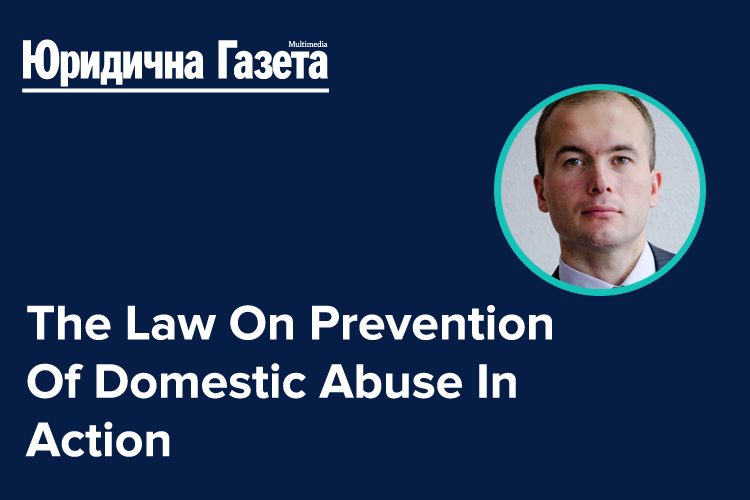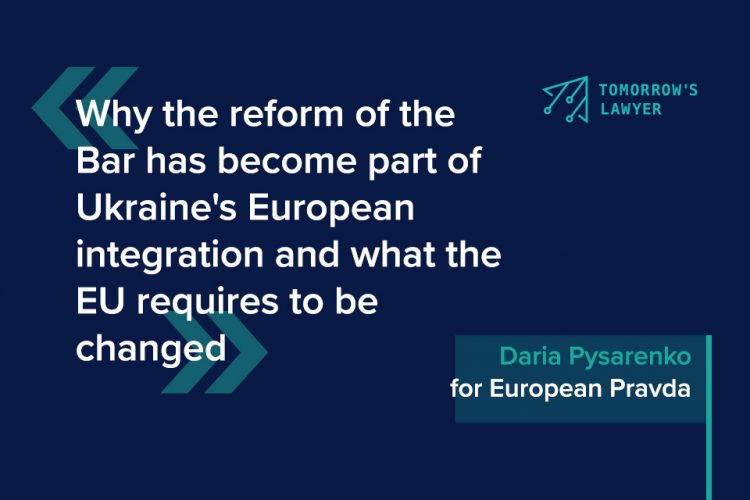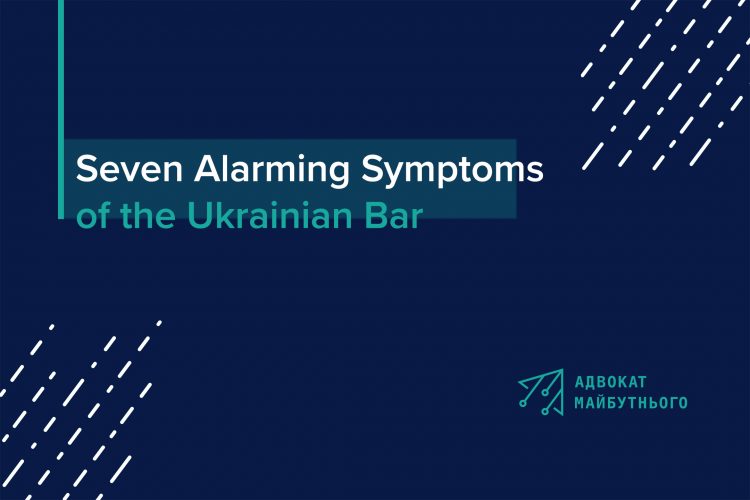


“And If It Goes To Fight, I Will Bite” — The Law On Prevention Of Domestic Abuse In Action
 Maxim Bratovchenko, a graduate of the “Tomorrow’s Lawyer” Program, conducted an analysis of the Law of Ukraine “On the Elimination of Domestic Violence” and explains the envisaged legal remedies to protect the victim and measures to influence the offender.
Maxim Bratovchenko, a graduate of the “Tomorrow’s Lawyer” Program, conducted an analysis of the Law of Ukraine “On the Elimination of Domestic Violence” and explains the envisaged legal remedies to protect the victim and measures to influence the offender.
The problem of domestic violence is unfortunately ambiguous in our society. Perhaps you will not be surprised by the fact that like many other children, in childhood I was subjected to violence in my family and witnessed such violence, so for me it is undeniable evil. From this phenomenon suffer individuals performing various social roles: wives and husbands, parents, children, close relatives, but according to statistics, the most vulnerable, regardless of their social roles, are women and children.
Naturally, the most dangerous is physical violence: beatings, torture, rape, abandonment, but psychological and economic violence is equally dangerous.
Studies conducted in the European countries show that the economic losses from the existence of this phenomenon are approximately 34 billion euros per country of the Council of Europe annually. For Ukraine, this indicator in 2016-2017 was 208 million dollars a year.
This phenomenon is not a problem of a particular state or an ethnic group, and that is why the civilized world has jointly decided to change the situation for the better. In 2011, in Istanbul, the Council of Europe has elaborated the Convention on Preventing and Combating Violence Against Women and Domestic Violence (CETS No 210, Istanbul Convention). The Convention was signed by 47 countries of the Council of Europe including Ukraine, and ratified by 25 countries. The Istanbul Convention is a comprehensive international instrument aimed at protecting, preventing, prosecuting and developing a strategy for combating violence against women and domestic violence. The Convention contains effective mechanisms for combating violence, as well as an international system for monitoring its implementation.
Ukraine has not yet ratified the Istanbul Convention. The relevant bill was considered by Parliament several times, but failed to win sufficient votes. On the other hand, on December 6 and 7, 2017 the Verkhovna Rada of Ukraine adopted, and the President subsequently signed the Law of Ukraine “On Amendments to the Criminal and Criminal Procedural Codes of Ukraine in order to implement the provisions of the Council of Europe Convention on Preventing and Combating Violence Against Women and Domestic Violence” and the Law of Ukraine “On Preventing and Combating Domestic Violence”. This is an implementation package of laws to the Istanbul Convention. While not exhaustive, but it is a big step forward.
It should be noted that only the Law of Ukraine “On Prevention and Combating Domestic Violence” came into force. The Law on Amendments to the Criminal and Criminal Procedural Codes comes into force on January 11, 2019, except for the amendments to Article 67 of the Criminal Code of Ukraine, coming into force on January 12.
In particular, new wording of paragraphs 3 and 6 was introduced, and paragraph 6-1 of part 1 of Article 67 of the Criminal Code of Ukraine added, which reflect the provisions of the Istanbul Convention regarding the aggravating circumstances of the commission of crimes on the basis of racial, national, religious hatred or discord, or on the sexual ground, as well as in relation to the elderly, disabled or a person in a helpless condition, or a person suffering from a mental disorder, in particular dementia, with intellectual disabilities, as well as the commission of an offense concerning an adolescent child or in the presence of a child, concerning the spouse or ex-spouse or other person with whom the offender is (was) in family or intimate relationships.
So, while the Law establishing criminal responsibility for domestic violence comes into force, let’s consider what protection a victim could rely upon starting from 01/01/2018.
Perhaps the most appealing novels of the Law are the special measures to combat domestic violence:
- an urgent injunction (Article 25 of the Law);
- restrictive prescription (Article 26 of the Law);
- adding abuser to the preventive record and conducting preventive therapy (Article 27 of the Law);
- submission of the abuser to the special educative program (Article 28 of the Law).
Let’s start with the injunction.
An urgent injunction is, so to speak, a fire extinguisher. The relevant decision shall be made by the National Police based upon the application of a victim of domestic violence or on its own initiative in a situation where there is an immediate threat to the life or health of the victims.
This provision contains a certain list of prohibitions/obligations for the offender:
- an obligation to leave the place of residence (stay) of the victim;
- a prohibition on entering and staying at the place of residence (stay) of the victim;
- the prohibition in any way to contact the injured person.
It does not matter who owns the place of residence (stay) of the victim. The action of the order is up to 10 days. If the offender refuses to voluntarily leave the victim’s place of residence (stay), the police have the right to apply coercive measures to evict.
A restrictive prescription for an offender is a measure of temporary restraint of rights or imposition of duties on a person who has committed domestic violence aimed at ensuring the safety of the victim.
This is a court order also directed to protect the victim and, in comparison with the police order, lasts longer (from 1 month to 6 month with the right to extension of up to 6 months) and the list of prohibitions/obligations is wider:
- a prohibition to stay in a place of joint residence (stay) with the victim;
- removal of obstacles in the use of property that is in joint or private ownership of the victim;
- restriction on communication with the victimized child;
- a prohibition to approach a certain distance to the place of residence (stay), study, work, and other places frequently visited by the victim;
- the prohibition in person and through the third parties of tracing the victims if they decide to stay at their own discretion at a place unknown to the abuser, to persecute them and in any way to communicate with them;
- the prohibition of correspondence, telephone conversations with the victim or contacting them through other means of communication personally and through third parties.
The court shall issue such order within 72 hours from the date of the applicant’s request. There is no court fee to be paid.
The urgent prohibition will be applied in accordance with the procedure, which is still to be approved by the Ministry of Internal Affairs of Ukraine, and it has six months to go (until 07.07.2018). Thus, such remedy will be available from the date of promulgation of the order.
The restrictive prescription is issued in accordance with the Civil Procedural Code of Ukraine, as amended accordingly, and the advantages of this type of protection will be available starting from 07/01/2018.
Adding abuser to the preventive record and conducting preventive therapy.
The responsibility for these activities is assigned to the National Police of Ukraine. The procedure for recording, taking off and keeping records and performing respective activities will be regulated by the procedure approved by the Ministry of Internal Affairs of Ukraine.
At first glance, this means of influencing the abuser does not appear to be effective in comparison with the injunctions, but from the point of view of the judicial protection of the victim, the prosecution of the abuser and the receipt of the restrictive injunction, the fact that the abuser was added to the preventive record can play its important role.
Submission of the abuser to the special educative program.
This part of the work (the establishment of respective institutions and funding) should be done by the local state administrations and local self-government bodies.
The decision to submit the abuser to the special educative program is made by the court. The term is from three months to one year.
If the abuser fails to attend the program or avoids the program without good reason, the authorities in charge of implementing educative programs for the abusers shall within three working days provide written notification to the authorized subunit of the National Police of Ukraine to take action.
The law contains many interesting novels which could be discussed and disputed. These issues as well as the maintenance of the Unified State Register of Domestic Violence and Gender-Based Violence, and the creation of general and specialized support services for victims, and, in the long run, changes to the Criminal Code of Ukraine and Criminal Procedural Code of Ukraine, which come into force only within a year, are all hard to cover within a single article.
Those who are familiar with the text of the Istanbul Convention can argue that the existing norms in Ukraine are not enough to effectively protect against domestic violence, that the preventative measures play an important role in the prevention of these phenomena, but a month ago we haven’t had at least what we have at our disposal now. If the public continues lobbying this issue in the parliament, and lawyers start creating a positive practice for the implementation of already adopted norms, international standards for protection against domestic violence will also come into force on the territory of Ukraine.
The material was first published on the website of Yurydychna Gazeta
The program encourages the participants resolve to conduct research and validation of human rights. We are proud that the Program participants work to strengthen the status of human rights in Ukraine and their respective protection.
The opinions expressed in this article are the author’s own and do not reflect the view of the “Tomorrow’s Lawyer” Program, the Ukrainian Bar Association, the Bar Association of Legal Aid Providers, the Quality and Accessible Legal Aid in Ukraine Project, the United States Embassy in Ukraine. the Canadian Bureau for International Education, or the Government of Canada.
Dear participants, the “Tomorrow’s Lawyer” Program encourages you to share with the Program community your success stories and professional life events. Please send your emails at: info@tomorrowslawyer.org.


